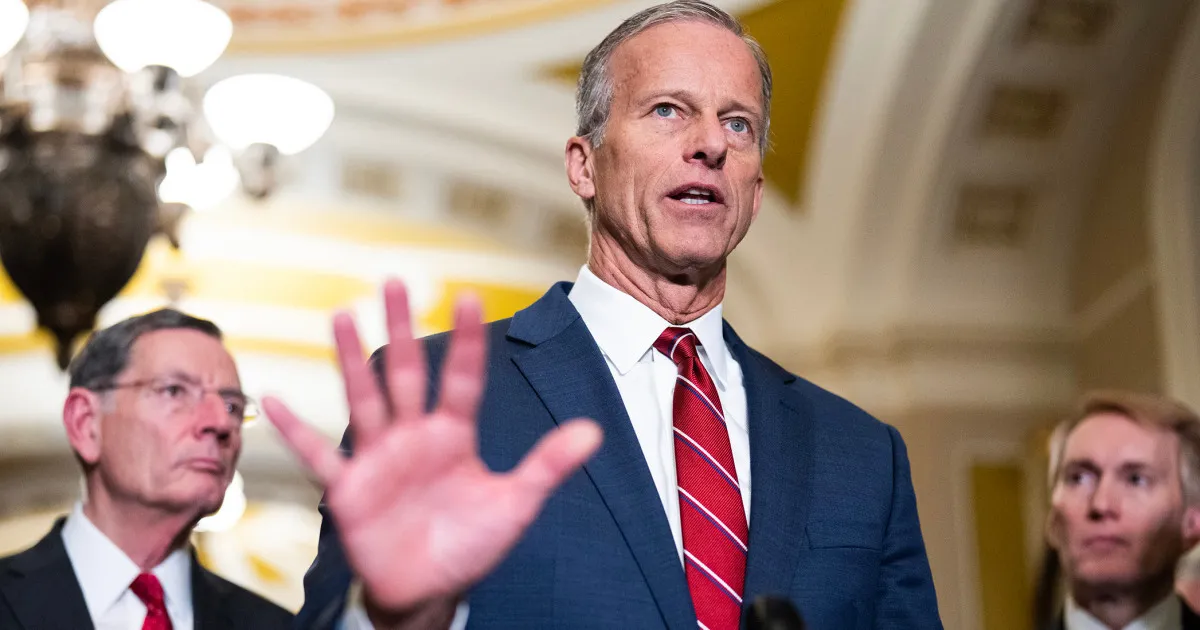
On Thursday, the Republican-controlled Senate voted 52-48 to initiate debate on a budget blueprint aimed at advancing President Donald Trump’s ambitious agenda. This substantial measure proposes significant tax cuts while also increasing funding for immigration enforcement and expanding the Pentagon's budget. It includes unspecified spending cuts and a proposed $5 trillion increase to the national debt limit, which is anticipated to significantly elevate the federal budget deficit.
All Republican senators supported the measure, with the exception of Sen. Rand Paul from Kentucky. In contrast, Democrats stood united in opposition. President Trump expressed his support for the Senate's budget plan via social media, stating that it equips lawmakers with the necessary tools to achieve shared priorities, including permanent tax cuts, spending cuts in energy, and historic investments in defense and border security.
This initial vote has set off a period of up to 50 hours of debate, followed by an unlimited amendment process before a final vote on adopting the budget blueprint, expected over the weekend. Democrats plan to introduce amendments designed to politically challenge Republicans, such as proposals to prohibit tax cuts for the wealthy and prevent cuts to Medicaid.
Senate Minority Leader Chuck Schumer of New York remarked, “You’re going to see a whole lot of amendments going after Donald Trump and the Republicans on issues where they favor billionaires over families.” Despite the Democratic push, Republicans, who maintain a 53-vote majority in the Senate, are anticipated to reject these amendments and ultimately approve the budget resolution.
If the House passes the same measure, it would enable committees to begin drafting legislation that could circumvent the Senate's 60-vote requirement, effectively sidelining Democrats in the legislative process. Notably, the budget blueprint indicates that Republicans plan to utilize a specific accounting method to assess the cost of making Trump’s 2017 tax cuts permanent at $0, despite a recent nonpartisan estimate suggesting it could cost $4.6 trillion.
The plan also permits an additional $1.5 trillion in tax cuts, giving the Senate Finance Committee the flexibility to determine the specifics of these cuts. GOP senators revealed to NBC News that they may leverage this opportunity to explore other tax proposals, such as eliminating taxes on tips. Sen. Lindsey Graham, R-S.C., chair of the Senate Budget Committee, stated, “Making the tax cuts permanent will help the economy. Determining the baseline is my job, not anybody else’s.”
The budget plan further lays the groundwork for $175 billion in new funding dedicated to immigration enforcement aimed at facilitating mass deportations, alongside a $150 billion increase in military spending. A pivotal issue remains regarding the extent of spending cuts Republicans intend to propose, with the measure currently suggesting only a few billion dollars in reductions—modest when juxtaposed with the significant tax cuts and spending increases it entails.
Sen. Graham noted, “When it comes to cutting spending, we’re not going to go after Medicaid benefits. There are a lot of things we can do.” He advocated for implementing “a work requirement for able-bodied people” on Medicaid, stating, “We’re going to cut, I think, trillions of dollars in spending,” albeit without detailing specific cuts.
The budget resolution also proposes a $5 trillion increase to the debt limit, necessitating action ahead of a looming deadline to avert a potential default on U.S. debt. The vote encountered a slight delay as Senate Majority Leader John Thune, R-S.D., conferred privately with some senators who had lingering questions regarding the procedural aspects of the upcoming legislation. Sen. John Kennedy, R-La., commented that the vote was crucial for maintaining focus among senators, stating, “The only way to get some senators to focus is to hold a vote.”
While Democrats lack the votes to halt the budget unless at least four Republicans defect, they are determined to make the vote politically challenging for the majority party. Sen. Elizabeth Warren, D-Mass., articulated the Democratic strategy, stating, “The job of the Democrats over the next 36 hours is to hold the Republicans’ feet to the fire and force them to tell the truth about their intentions regarding the American economy.” She emphasized that Democrats are fully committed to the fight.